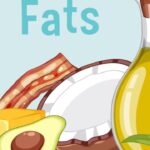It is often seen that fat in diet is thought of as a major contributor to the health status of people, weight loss and better eating habits. While it seems a reasonable approach to take, eliminating fat from your diet is not as easy as it sounds. This article will focus on some common mistakes people when trying to reduce fat in thei diet. You will understand how one can attain an equilibrium reducing unhealthy fats at the same time providing healthy meals.
Many of us were raised on what we call “fat is bad” and low fat diets guarantee both weight loss and heart health. Like other things some kinds of fats are really harmful but there is a lot more complexity in this matter. This is because not all fats are bad according to science and some oils are required by the body for effective functioning.
Mistakes People Make When Trying to Reduce Fat in Their Diet
Mistake #1: Cutting Out All Fats Entirely
Fat is bad, right? Then no-fat must be the best. Nonetheless, this could be a misconception that could lead to serious mistakes hence removing all fats from diets may not be a good idea at all as our bodies need them to function well.
Among other things, fats help with hormone production and cell structure; they also aid absorption for key fat-soluble vitamins including A,D and K vitamin groups essential for one’s body. Due to insufficient intake of fats ingestion into one’s system cannot take place which would cause serious health problems and deficiencies within the human body.
In order to avoid this: do not cut off fats completely but rather reduce unhealthy ones while keeping the healthy ones in what you eat. This involves replacing bad processed high fat foods with healthy ones made from natural ingredients.
As an example spray some olive oil instead of using margarine on your slices of bread or use unrefined coconut oil as frying agent instead of butter.
Error #2: Going Overboard on “Low-Fat” Or “Fat-Free” Processed Food
The labels “low-fat” or “fat-free” can be misleading when it comes to food. Most processed foods marketed as low fat have added sugars, sodium and artificial substances to replace the missing taste and texture after removing the fats. While these items may sound healthier than regular ones, they eventually cause weight gain and other diseases.
How to avoid it: Do not let low-fat labels deceive you. ensure to read nutrition labels properly. Hidden sugars are usually disguised under various names along with proper additives they are attached to. It is better to concentrate on unprocessed whole foods rather than relying on processed low-fat products.
Tip: Opt for natural sources of low fats like fruits vegetables and lean proteins such as chicken or fish. These whole food types contain dense nutrients that do not have hidden downsides unlike most packaged products with little amounts of fats.
Error #3: Replacing Fat with Refined Carbohydrates
People often substitute refined carbohydrates such as white bread, pasta as well as sugary snacks when they reduce fat from their diets.
This change might do more harm than good in reality since these carbohydrates lead to rapid elevations in blood sugar levels which can trigger hunger stimulating hormone release plus cravings together with fat storage This eventually results into weight gain insulin resistance among others diseases caused by dietary factors
Mistake #4: Forgetting Portion Control
Lots of people eat good fats like avocados, nuts, or olive oil, but they often don’t remember that these foods hold many calories. Eating too much of them might still cause weight gain. Sometimes people finish a whole bag of nuts or add extra oil to a salad, thinking it’s healthy. But those calories can rise quickly.
Avoid this problem by knowing the right amounts for fat-rich foods. A handful of nuts means around one ounce, and about one tablespoon of olive oil works well for a salad. Simple tools like measuring spoons help keep portions correct.
Visual cues also assist. A portion close to the size of your thumb fits fats like oils or nut butter. Eat slower and enjoy the food to stop overeating.
Mistake #5: Only Reducing Saturated Fat
Cutting down on saturated fat may help your heart, but only focusing on that and ignoring other things in your diet might create an imbalance. If someone cuts out red meat but eats more sugar, it doesn’t truly improve health. The bigger picture matters, not just the fat amount.
To avoid this mistake, think about your whole diet. Sure, cutting saturated fat might benefit you, but also stay aware of sugar, processed foods, and daily calorie amounts. Keeping a mix of healthy fats, proteins, and good carbs leads to real long-term health.
Try healthier options like olive oil, seeds, or nuts instead of butter or fatty meats. It’s fine to have natural saturated fats like coconut oil or dairy sometimes, just in smaller amounts.
Mistake #6: In processed and restaurant meals there are secretive fats that you may sometimes forget about. Several trans fats and unhealthy oils are included in most of processed foods and also those served in restaurants.
Trans fats do exist in pastries, snacks, sauces and also fried foods as hidden fats even when a product claims to be low in fat. As you consume them over time, they may gradually be unhealthy oils or hidden fats which remain unnoticed.
Caution: Always read food labels or look at restaurant menus closely. Such type of terminology like “hydrogenated oils” or “partially hydrogenated oils” indicates trans fats. The best thing to do if you eat out is ordering sauces and dressings on side while choosing grilled or baked meals instead of fried ones.
Recommendation: Try cooking more meals at home so that you know what your meal contains. For example, grilling steaming or baking are some of the ways that can help you reduce unnecessary fat by using good cooking techniques at home. You should consider sharing meals when going out or taking away half if there is too much food.
Mistake #7: Not Getting Enough Omega-3 Fatty Acids
Fatty acids omega-3 characteristically help in the body’s heart health, brain function and inflammation reduction. Cutting fats off from diet unwittingly cuts omega-3 intakes as well. This is especially alarming since omega-3s obtained from fatty fish such as salmon, walnuts, flaxseeds and chia seeds have been shown to be very beneficial to health.
How to get around it: It is important that you include omega-3-rich foods in your diet when cutting down on other types of fats. Aim at consuming fatty fish a minimum of two times weekly or alternatively consider incorporating a high-quality fish oil supplement into your routine.
Tip: Put chia seeds or flaxseeds on salads, oatmeal or smoothies for an easy way to get more omega 3’s. Alternatively pack some walnuts as a convenient snack option loaded with these important nutrients
Mistake #8: Not Understanding the Role of Dietary Fats in Satiety
Fats play a significant role in making you feel satisfied after meals .Drastic reduction of fat intake can result in constant feelings of hunger and bring about eating more hence causing increased cravings for unhealthy foods over time. It is for this reason that most low-fat diets are very difficult to maintain over long periods of time.
To evade this: To encourage fullness and avoid excessive eating, it is essential to include healthy fats in every meal. Specifically, unsaturated fats from fish, nuts, seeds and avocados can really assist you to remain satiated for a longer time because they are known to have the ability to suppress appetite pangs. For best outcomes, fats should be taken alongside protein and fiberous foods.
A suggestion: A small amount of healthy fat should be added on snacks to stave off hunger. For instance, when you combine apple with one tablespoon of almond butter or handfuls of nuts together with some fruit will result into a balanced snack that keeps the peace.
Mistake #9: The assumption that all food guides are universal among all people
People easily follow generalized food guides without taking into account individual factors. But there is no single nutritional advice that suits everyone. Genetics, physical activity and health states play a significant role in whether fat intake is high or low as well as what kinds of fats really suit you.
How to evade this: The best way to reduce fat is through personalizing your approach towards fats considering your health issues and aims.
For instance individuals suffering from specific health issues such as high cholesterol or diabetes may need to change their amount of fat consumed. And a nutritionist or a doctor can help you create a plan that suits you best in terms of diet.
Tip: Try out different diets like Mediterranean or ketogenic and take note of how your body responds.
Mistake #10: Failing to Balance Fat Reduction with Overall Nutrient Density
Losing weight by eating less fat is not the only goal for nutritionists today. One of the most common mistakes people make in their eating habits is concentrating on reducing cholesterol levels too much that they forget about getting enough nutrients into their bodies.
If you just cut down on fats without considering how rich your food should be in nutrients, it would be hard to survive because essential vitamins, minerals and other significant nutrients are absent from such a diet. The skin and hair might become ugly when dietary fats are too little or no more energy flows through your arms.
How to avoid it: Don’t just think of cutting down on fats; get more healthy foods like vegetables, fruits, whole grains and lean proteins as well as lets’s become fat wise. You will be able to provide your body with everything they need for proper absorption.
Tip: Include nutritious foods with healthy fats when planning your meals. For instance, a leafy green salad filled with greens, chicken breast (or other form of lean protein), avocado slices along with few chia seeds would ensure having high-nutrient food choice thus making you feel satisfied after eating.
Read also: Is Low-Fat Dieting Still Relevant? Exploring Modern Nutritional Advice
Conclusion
Cutting fat from your meals might help your health. Be careful though. Avoid big mistakes like removing fat completely or depending too much on low-fat processed foods. Balance matters. Eat good fats but watch your portions and other nutrients. Taking care of your diet like this keeps you healthier for a long time.



